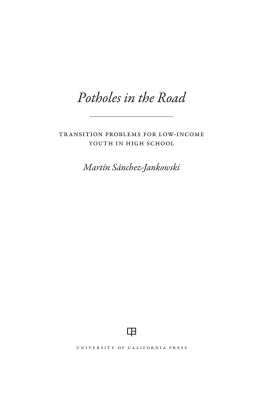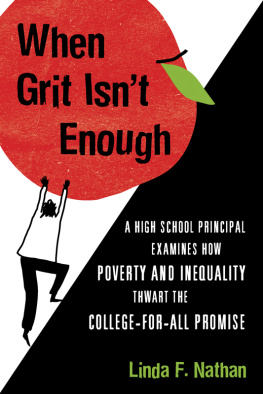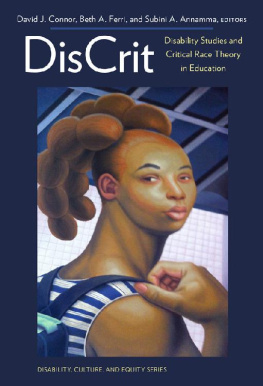2.1.
4.1.
4.2.
4.3.
4.4.
4.5.
4.6.
4.7.
4.8.
4.9.
4.10.
4.11.
5.1.
1.1.
3.1.
MA.1.
PREFACE
Formal education has been seen as the keystone of all modern societies because it provides essential knowledge for advancing economic and social life. Yet, despite recognizing the importance of education, modern societies have had difficulty in providing equal educational opportunities for all segments of their societies, especially those from low-income families. Personally, I have understood the importance of education for improving the lives of individuals in societyI was a person from a low-income family who was able, through education, to be socioeconomically mobile. What is more, I have been an educator for my entire professional life, first as a junior and senior high school teacher in a number of Detroit inner-city schools, and finally as a university professor. Thus, this book carries both a personal and profession interest into understanding the problems encountered by both students from low-income families and educators in creating successful academic outcomes.
I turn now to that part of a preface which is the most enjoyable to methe acknowledgment of the people and institutions that contributed to the books completion. Let me begin by thanking the Spencer Foundation, the John D. and Catherine T. MacArthur Foundation, the Robert Wood Johnson Foundation, and the University of Californias Faculty Research Program for their financial support that allowed me to carry out the twenty-three years of field research for this project.
Special thanks must be extended to those who directly aided the research part of the project. That starts with thanking the various school district officials, as well as the school administrators, staffs, teachers, counselors, and students, who allowed me to be involved in their lives over the time covered in the study. Also, I would like to express gratitude to all the parents who over the years invited me into their homes to share that part of their families lives.
Next, I want to thank the people who aided in the completion of the book. Portions of the book were presented at various lectures I gave, and I so much appreciate those in the audience who provided substantive comments. I would also like to thank John Ferry of the Estate of R. Buckminster Fuller, who researched the exact source of the quote of Mr. Fullers that I used as the lead epigraph for the book. In particular, I want to express my enormous appreciation to Claude S. Fischer, Corey M. Abramson, Gilberto Q. Conchas, and Lynn S. Chancer for reading all of the manuscript and providing detailed comments that have greatly improved it. Of course, having acknowledged their contributions, I also want to make very clear that all those who commented on the book and provided financial support for the books research are not responsible for any errors or defects that may exist. That responsibility lies solely with me.
Over the years, I have been fortunate to work with the University of California Press and the professional staff associated with it. I thank Naomi Schneider for all that she has done for this book project. She continues to be a wonderful editor to work with. I also want to acknowledge the terrific help I received from Summer Farah for her logistical assistance in preparing the manuscript for production, as well as Francisco Reinking for efficiently managing the production process. Of course, I would be remiss if I did not thank Paul Tyler for the wonderful job he did in editing the manuscript and making it more clear and readable. This is the first time I have worked with him and it would be an honor to do so in the future. Last, but certainly not least, I want to thank Eileen Hout, the artist whose work graces the cover of the book.
Now, a word about the three educators to whom this book is dedicated. The late Lewis I. Jeffries was a junior high school teacher, principal, and district administrator in Detroit who supervised the student-teacher experience required for the secondary education degree, and Richard P. Young and Roger L. Dial were university professors. All three were special in sharing their knowledge and time with every student they had contact with. It would be hard to find a student from their courses who did not appreciate what each gave to them. I was fortunate and grateful to have all three.
Finally, I want to thank various family members who provided moral support during the research and writing of this book. The first expression of gratitude must go to my late wife, Carmen, who was so instrumental in all my research projects because she both encouraged me and maintained our home during the long periods of time I was away doing extended field research. She unfortunately passed away a few years ago, so there is emptiness associated with writing this part of the preface.
My second expression of gratitude goes to the other family members who tried their best to fill in for Carmen. A big thank you must go to my brother Mike and sister-in-law Sharon, brothers-in-law Frank and Luciano, sister-in-law Inga, Maria Martinez, and David Montejano for their continued support; as well as my three sons, Javier, Julin, and Andrs.
It has been my custom with other books I have written to discuss the title I selected for the book at the end of the preface. Usually I would take the opportunity to inform the reader how the title was chosen and in what ways it related to the argument developed in the book, but that is not necessary this time. Simply stated, the title of this book, Potholes in the Road , is a straightforward depiction of what is developed throughout the book. Nonetheless, I do have something to say regarding the title. As some readers will recognize, this is the third title of a book I have written that refers to a passageway, the other two being Islands in the Street and Cracks in the Pavement. Although all three titles capture the substantive argument in each book, I have promised myself that this is the last time I will use a roadway symbol for a book title. So, despite my affectionately referring to these three as the Detroit Title Trilogy, undoubtedly others will be relieved by this commitment.












